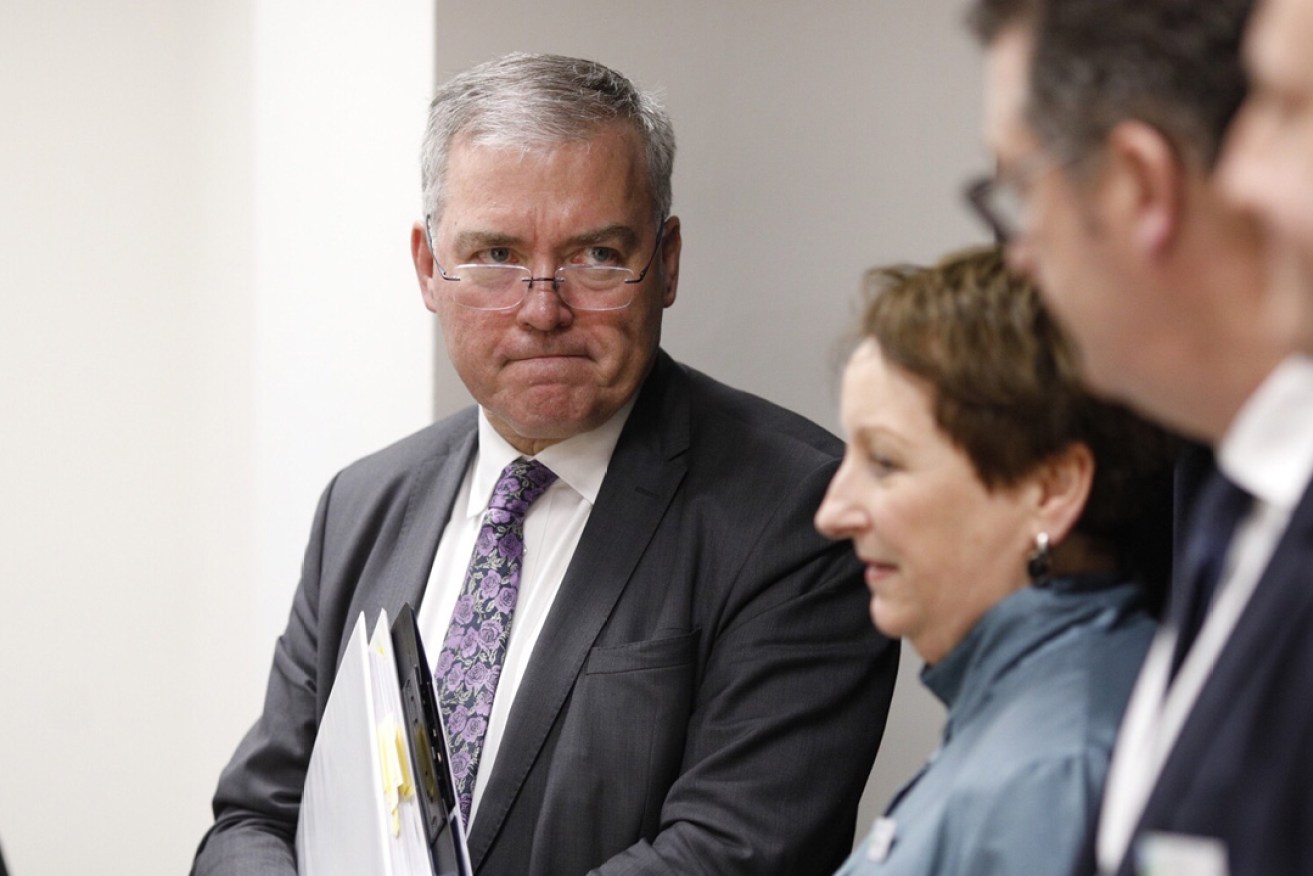An alternative whistleblower hotline
A long and tragic record shows that leaks to the media – rather than competent internal processes – have forced improvement on SA Health, argues InDaily reporter Bension Siebert.


Stephen Wade with administrators and staff at a media briefing. Photo: Tony Lewis / InDaily
The State Government this week released KordaMentha’s scathing report into the Central Adelaide Local Health Network – a basket case organisation, successive reports have now shown. The government’s solution includes putting auditors in charge of CALHN’s finances and offering concerned SA Health staff a whistleblower’s hotline.
At this point in the electoral cycle, when the most voters still blame Labor for the woes of the health system, it makes good political sense to air SA Health’s dirty laundry in this way.
As blame and scrutiny inevitably shift to the Marshall Government later in the term, Health Minister Stephen Wade and the department’s new crop of executives may be hoping that appalled and aggrieved SA Health employees turn to the new whistleblower hotline – thus keeping their complaints internal.
It will be a novel option for the more courageous among said employees, whose traditional point of contact has been Adelaide newsrooms.
As in most government organisations that threaten to sack staff for unauthorised disclosures, those who leak information to the media make up only a tiny proportion of those who witness, or are victim to, the worst of the hidden failure and misconduct.
This enforced opaqueness is, I think, a partial explanation for the culturally enabled “disrespectful and unethical behaviours” which new CALHN CEO Lesley Dwyer describes as endemic within the organisation.
And if a lack of transparency is part of the problem now, it was certainly part of the problem when SA Health received the last devastating report into CALHN’s deep cultural, structural and management problems two years ago.
But if the past several years have taught us anything about SA Health, it’s that scandal, embarrassment and public exposure – not good internal governance, nor well-designed avenues of complaint, nor clear lines of accountability – are key drivers of major change in the department.
The theme of almost every recent SA Health scandal has been that senior staff often knew what was going on and yet they did nothing – or did far too little, far too late.
Rather than prompting meaningful change, report after scathing internal report and warning after serious internal warning are, more often than not, subsumed into the internecine warfare between the competing fiefdoms that hold the power within SA Health.
Even when the Government or the bureaucracy is in the course of investigating some egregious example of misconduct or maladministration within the department, it’s been media pressure that has forced (or, more modestly, strongly encouraged) them to take decisive action.
Were it not for months of reporting on the abuses of elderly dementia patients at the Oakden Older Person’s Mental Health Service in early 2017, would the then-Government have closed it?
Or would Dr Aaron Groves’ Oakden Report have fallen into the too-hard basket, just like the Stafrace and Lilly report into the same facility, describing many of the same problems, was, a decade earlier?
In recent years, at least three people have died by apparent suicide after treatment at the Lyell McEwin Hospital mental health short stay unit.
The facility had enabled suicide attempts by its physical design and mental health patients were put at risk by being discharged from it without follow-up.
In December 2017, InDaily obtained a doctors’ union safety inspection report into the facility and asked SA Health what it was going to do about it.
“We take the concerns from Safework SA and SASMOA seriously and will no longer be admitting mental health consumers to the unit,” a department spokesperson told us, that same day.
We now know that the grave dangers associated with the short stay unit were well-known to SA Health, because the unit’s staff, the Community Visitor Scheme and the doctors’ and nurses’ unions had been warning about it for two-and-a-half years.
Borderline personality disorder has been linked to the death of several young South Australian women over the past three years.
InDaily has published a series of reports over the same period on the inadequacy of available treatment for the disorder in South Australia and its tragic consequences.
At this year’s state election, the Liberal Party and then Labor committed to fund a $10 million centre for excellence in the treatment of borderline personality disorder, modelled on highly successful facilities interstate.
All of this is not to say that the media holds the keys to all or most of the important decisions made by senior bureaucrats and ministers.
Nor am I disputing that there are good people – thousands of them – working in good faith, trying to solve its deep structural defects from within.
Nor am I saying that that the department never resolves important issues out of the public spotlight.
But I am saying that SA Health has a long record of ignoring legitimate grievances before they make it into the public realm, and that media scrutiny works in a way that internal complaints don’t.
So allow me, perhaps selfishly, to suggest an alternative to SA Health’s new whistleblower hotline: call your local newsroom today.




